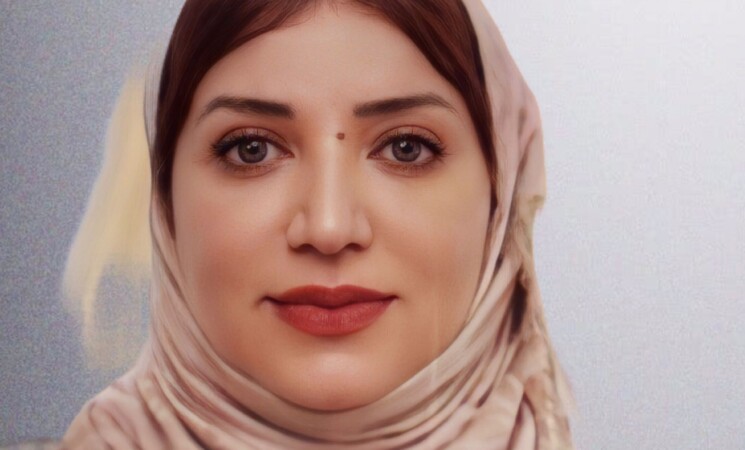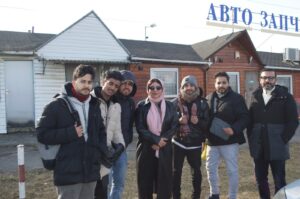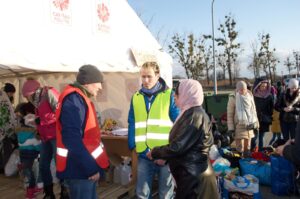Since I was appointed an accredited ambassador in Poland and a non-resident ambassador in Ukraine,
I have been in constant contact with Yemenis in the two countries. The Yemeni community in Ukraine is a relatively small one, composed of about 750 Yemenis, most of whom are qualified young people in various disciplines.
It never crossed my mind that a day would come when this Yemeni community - after its first displacement due to the war in Yemen - will lose its safety and stability for the second time but this time in a European country.
Although the number should have been manageable, the particularity of this community including the need for Yemeni identification documents (passports), and the basic requirements of food, shelter, and transportation costs were challenging, given that Yemen is basically living in a reality of war with a very fragile economy. Yet this did not prevent me from working on securing a safe haven for dozens of Yemenis and their families, who often belonged to the Ukrainian nationality by virtue of marriage and integration in the European community, especially since some of them have been residing in Ukraine for many years.
The embassy was a beehive, resolving multiple issues at the same time. We were working to secure the safe exit of dozens of people from the besieged Chernihiv area. We heard the bombing around them on the phone as we give them the necessary information to get out and directed them to safer areas and which roads they should take to reach safely. We coordinated between them and people from different nationalities to help them in the different stages of their escape until they reach the crossing. At the same time, we were helping the Yemenis who had reached the Medyka crossing so that they could reach the safe Polish border. There we would talk to anyone who would listen, Ukrainian and Polish authorities, relief organizations working at the crossing, and even members of other communities to try and seek their support for our Yemeni refugees.
I will never forget the goodbye words of university student Emad when he was despairing after spending more than two days in the open and cold with sub-zero temperatures and without food or even water.
Emad’s words were as if they were his last, he believed that death was inevitable because his body temperature began to drop. Despite the gloom, he was still kind and appreciative, as he thanked me and the embassy team in supporting his escape with his fellow students up to the Ukrainian borders. “Do not be sad that we died from the cold at the crossing, for you did your best and we do not blame you, because of you we were able to survive until the moment,” he said to me in a weak despairing voice.
Emad was not the only one, as there are many Yemeni men and women, including children and the elderly, who suffer mainly from chronic diseases, such as the medical student Aghadir, who suffers from a Sickle cell anemia, and who suddenly found herself without medical care or even shelter and in extremely difficult conditions imposed by war and displacement.
Although the Medyka crossing is 450 kilometers from the capital Warsaw, where I live, I did not hesitate to go there with the Yemeni consul in order to help overcome the difficulties the Yemeni refugees were facing, including proving their identity in order to be allowed to cross to Polland, or even at least tell them we are here and we will not abandon them, perhaps moral support strengthens their determination and ability to survive and endurance.
I was standing on the Polish-Ukrainian border, me and the Yemeni consul and sending documents to the border guards on both sides to prove the citizenship of Yemenis who had lost documents because of the war in Ukraine or in Yemen before that. I was in constant contact with the humanitarian relief agencies, urging them to deliver food and water to the transiting Yemenis on the Ukrainian side, as neither the relief agencies nor I could enter the Ukrainian lands.
It felt that our continuous communication with Yemeni refugees, urging them to stay together and rationalize the use of the phone so as not to lose contact with them in case the batteries run out, was their only lifeline as they were in the difficult circumstances like hundreds of thousands of displaced people who fled with their lives from under the bombing.
I was giving them hope that relief would come despite the difficulty, and sometimes impossibility of this so that they would at least resist until the support actually arrived in the last moments due to the mighty actions of humanitarian relief organizations and the Polish government, who provided aid to all refugees without any discrimination.
Yemenis in Ukraine are suffering from a double misfortune. From the continuous war in Yemen which entered its eighth year, and its humanitarian crisis, which is the worst in this century. And now after relocating to another country they find themselves suffering from a new war that reminded them of losing their first homeland and now the loss of their new home.
What is happening in Ukraine is a hideous injustice, but we hope that the European and international community will embrace all refugees but the Yemeni men and women in particular who have been affected by the war in Ukraine, as others have homelands to return to, these refugees don’t have that option. I used to see planes coming from different countries of the world to evacuate their citizens to safety, except for Yemen, for we do not have this option, and returning home has become a luxury that we cannot secure for our people.
Today, as the world turns all its attention toward what is happening in Ukraine, it should not forget that Yemen has been experiencing a terrible tragedy for the past seven years. War is war. And human dignity must be preserved for all human beings, regardless of their nationality or race. Humanitarian principles are indivisible.
Dr. Mervat Mojali is the accredited Ambassador of Yemen to Poland and a non-resident Ambassador to Ukraine. In addition to her work in the diplomatic corps, she has a cumulative experience of more than 15 years in humanitarian and relief work.
 English
English


